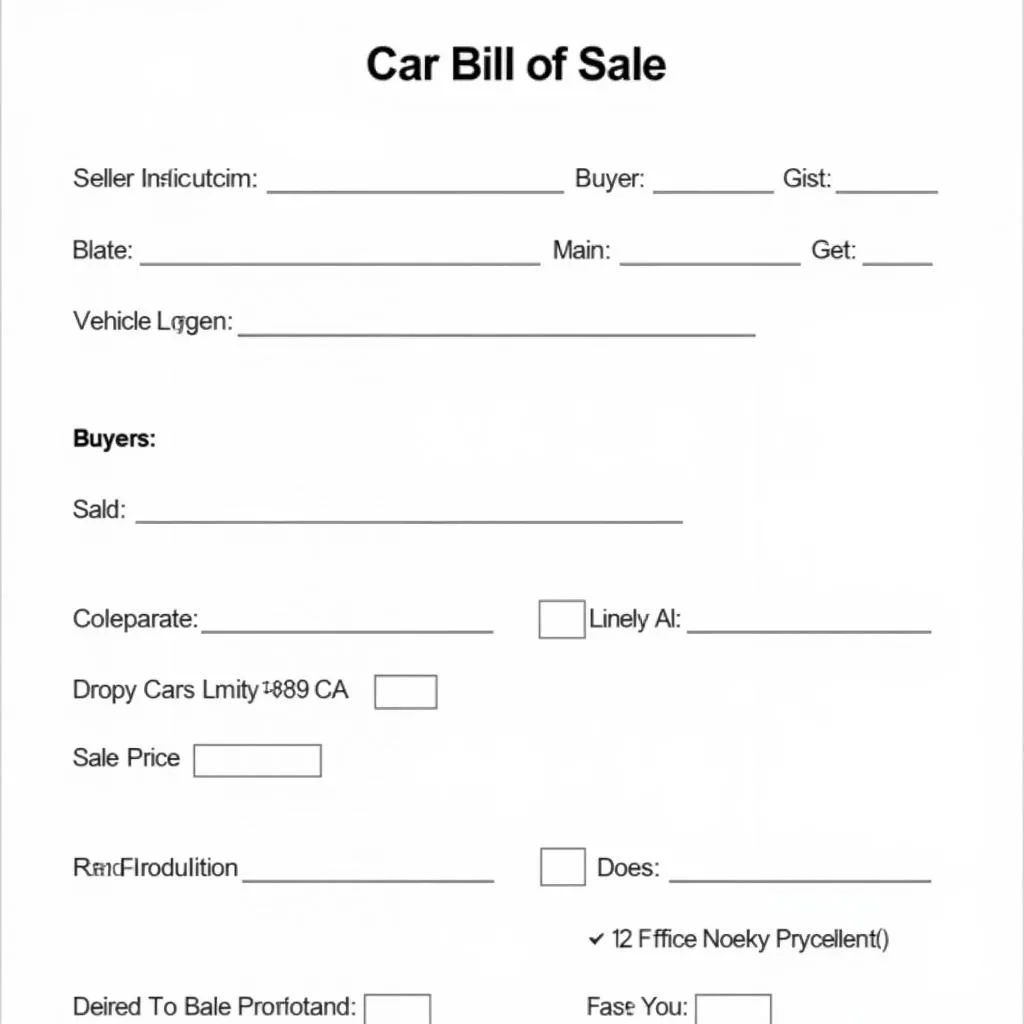Selling or buying a used car is an intricate process, with one of the most crucial steps being the creation of a bill of sale. This legally binding document serves as proof of the transaction and protects both the seller and the buyer from potential disputes. But how exactly do you write a bill of sale for a car? This comprehensive guide will walk you through everything you need to know, ensuring a smooth and legally sound car sale.
What is a Bill of Sale for a Car?
A bill of sale for a car is a legal document that records the transfer of ownership of a vehicle from the seller to the buyer. It acts as a sales receipt, verifying that the transaction took place and outlining the terms of the sale. This document is essential for both parties as it protects their rights and helps prevent misunderstandings or legal issues down the road.
Why is a Bill of Sale Important?
While it may seem like an extra piece of paper, a bill of sale offers numerous benefits for both the buyer and seller:
For the Seller:
- Proof of transfer of ownership: Protects you from any future liability associated with the vehicle, such as parking tickets or even involvement in illegal activities.
- Legal protection: Serves as evidence in case of disputes regarding the sale price, terms, or condition of the vehicle.
- Faster release of liability: Facilitates a quicker process of removing your name from the vehicle’s registration and insurance.
For the Buyer:
- Proof of ownership: Essential for registering the vehicle in their name and obtaining insurance.
- Legal recourse: Provides legal grounds to pursue action against the seller if any issues arise with the car after the sale that were not disclosed.
- Peace of mind: Assures the buyer that the transaction is legitimate and that they have legal rights to the vehicle.
Essential Elements of a Bill of Sale
A comprehensive bill of sale for a car should include the following information:
- Date of Sale: The exact date on which the transaction is taking place.
- Seller Information:
- Full legal name
- Address
- Phone number
- Driver’s license number (optional)
- Buyer Information:
- Full legal name
- Address
- Phone number
- Driver’s license number (optional)
- Vehicle Information:
- Year, make, and model of the car
- Vehicle Identification Number (VIN)
- Mileage (odometer reading)
- Color
- License plate number
- Sale Price: The agreed-upon price of the vehicle.
- Payment Method: How the buyer will be paying for the vehicle (cash, check, cashier’s check, financing). If financed, specify the lender’s name.
- “As-Is” or Warranty: Clearly state if the vehicle is being sold “as-is” or with any warranties. An “as-is” sale means the buyer accepts the vehicle in its current condition with all known and unknown faults. If a warranty is included, specify its terms.
- Signatures: Both the buyer and the seller must sign and date the bill of sale.
 Sample Car Bill of Sale Template
Sample Car Bill of Sale Template
Tips for Writing a Bill of Sale
- Use a Template: Various online resources offer free, printable bill of sale templates specifically designed for vehicles. These templates ensure you include all the necessary information.
- Be Specific: Provide detailed information about both the seller, the buyer, and the vehicle to avoid any ambiguity.
- Legible and Clear: Write or print clearly so all information is easily readable. Use black or blue ink for signatures.
- Multiple Copies: Make at least two copies of the signed bill of sale – one for the buyer and one for the seller.
- Review Carefully: Both parties should carefully review the bill of sale before signing to ensure accuracy and agreement on all terms.
- Notarization: While not always required, having the bill of sale notarized can add an extra layer of legal protection.
FAQs About Writing a Bill of Sale for a Car
1. Is a handwritten bill of sale legally binding?
Yes, as long as it includes all the essential elements and is signed by both parties. However, using a template is recommended for clarity and completeness.
2. Do I need a bill of sale if I am selling the car to a family member?
Yes, it is still recommended to create a bill of sale even for transactions between family members. This document helps avoid misunderstandings and ensures a legal record of the transfer of ownership.
 Buyer and Seller Signing a Car Bill of Sale
Buyer and Seller Signing a Car Bill of Sale
3. What happens if there is an error on the bill of sale after it’s been signed?
Both parties can void the original bill of sale and create a new one with the correct information.
Conclusion
Writing a bill of sale for a car is a simple yet crucial step in the vehicle selling process. This document safeguards both the buyer and the seller, providing legal protection and peace of mind. By including all essential information, being thorough, and reviewing carefully, you can ensure a smooth and legally sound car sale transaction.
Remember, this guide is for informational purposes only and should not be considered legal advice. For specific legal concerns regarding a car sale, it’s always best to consult with a qualified legal professional.
Need Help? Contact DiagXcar!
Have more questions about vehicle diagnostics, car buying guides, or need expert advice? DiagXcar is here to help. Contact us via WhatsApp: +1(641)206-8880, Email: [email protected], or visit us at 276 Reock St, City of Orange, NJ 07050, United States. Our dedicated team is available 24/7 to assist you.


